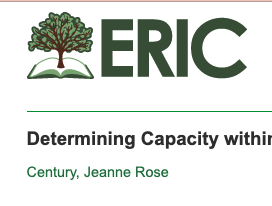by Jeanne Rose Century
Summary: The idea of “capacity” is particularly important in the reform of educational systems because the system can be both the initiator and the subject of change. In fact, the requirement for capacity is present at all levels of the system in systemic reform. In educational change, four types of capacity are generally considered: (1) human capacity; (2) organizational capacity; (3) structural capacity; and (4) material capacity. Because there are so many types of capacity, evaluators may find a general organizing structure for looking at capacity useful before they set out to identify specific questions and indicators for evaluating capacity. A matrix is provided to allow evaluators to focus on the different types of capacity as “drivers” of targeted studies designed to match the more immediate strategies and goals of the reform. Examining capacity is one of the ways educational evaluators and researchers can examine reform efforts more thoroughly.
Citation: Century, Jeanne Rose (1999). Determining Capacity within Systemic Educational Reform. Washington D.C.: Distributed by ERIC Clearinghouse, https://eric.ed.gov/?id=ED434162

